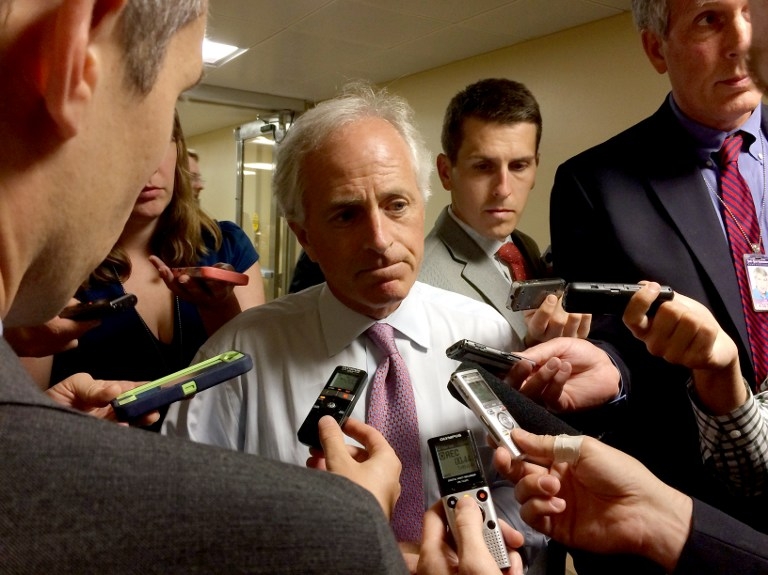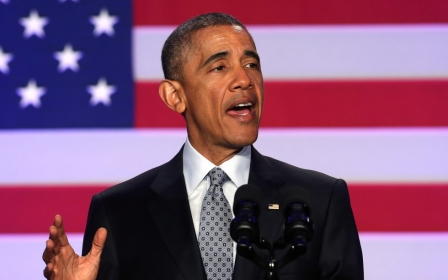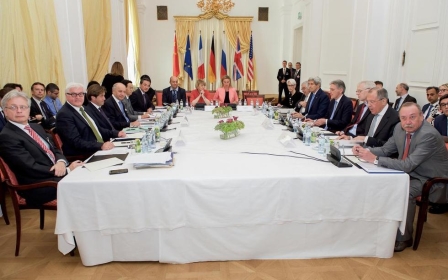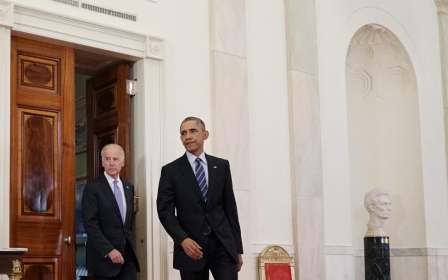ANALYSIS: US Iran deal opponents stick to their guns, but lack numbers

NEW YORK – Hardliners in the United States who have long argued against bargaining with Iran stuck to their guns after a nuclear deal was announced on Tuesday, though it appeared unlikely that they could derail one of President Barack Obama’s signature foreign policy achievements.
Almost as soon as the agreement was announced in Vienna, in which sanctions imposed by the US, European Union and UN will be lifted in return for Iran agreeing to long-term curbs on its nuclear programme, conservatives in the US were already raising objections.
“This isn’t just a nuclear deal for Iran. It’s a deal to revitalise its dying ideology, stabilise the regime, finance terror and dominate the region while preserving its nuclear weapons capacity,” Ryan Mauro, a right-wing security analyst told Middle East Eye.
“If I were an Iranian strategist seeking the most efficient path toward getting a nuke and achieving regional dominance, I’d recommend a deal like this. It fails to disarm Iran, enables Tehran to keep its nuclear weapons capacity and takes away Washington’s ability to implement effective sanctions.”
Key members of the Republican Party were similarly quick to denounce the deal. Mike Huckabee, a former Arkansas Governor with ambitions on the White House in 2016, blasted Obama’s team for “agreeing to a deal that empowers an evil Iranian regime to carry out its threat to ‘wipe Israel off the map’".
Bob Corker, the Republican chairman of the Senate foreign relations committee, outlined his “deep scepticism” of the agreement and accused Obama of crossing “red line after red line” with concessions to Iranian negotiators.
“In the coming days, Congress will need to scrutinise this deal and answer whether implementing the agreement is worth dismantling our painstakingly-constructed sanctions regime that took more than a decade to establish,” Corker said.
Congress has 60 days to review the agreement, though if it rejects the deal, Obama can use his veto. On Tuesday, the president confirmed that he “will veto any legislation that prevents the successful implementation of this deal".
“We do not have to accept an inevitable spiral into conflict. And we certainly shouldn’t seek it,” Obama said in a televised address. “And precisely because the stakes are so high, this is not the time for politics or posturing. Tough talk from Washington does not solve problems.”
It would require two-thirds of lawmakers to override a presidential veto, which means some of Obama’s fellow Democrats would have to rebel against one of the US leader’s signature achievements in order to torpedo the agreement.
“What comes next for the US and Iran will not be easy,” said Suzanne DiMaggio, a former UN officer. “The agreement will be pored over by both opponents and supporters of US engagement with Iran. The Congressional review process is expected to be particularly tough.”
While Republicans can scrutinise the deal and raise objections in Congress, nixing it would involve drafting legislation specifically undermining the agreement that would then have to pass both the House and Senate with veto-proof, two-thirds majorities.
Aaron David Miller, a former State Department advisor, said he expected Israel and Saudi Arabia – longstanding US allies in the Middle East who argue vociferously against negotiating with Tehran – to use their influence in Congress to scupper the deal.
“It will take several months to determine if this agreement will function. It faces hurdles in Congress, where it needs approval and faces obstruction from Republicans,” Miller, a Middle East scholar at the Wilson Center thinktank, told MEE.
“The Saudis and Israelis will try to persuade congressional Democrats that this is a fundamentally flawed agreement. I wouldn’t rule out the idea of Israelis going to cyber warfare, to black ops against Iran.”
But the deal also has supporters, and Obama is buoyed by the attitudes of a war-weary public. In March, the Pew Research Center, a polling group, found that more Americans approve (49 percent) than disapprove (40 percent) of the US negotiating with Iran over its nuclear programme.
Likewise, there are also many Americans who accept Obama’s argument that the US had to make compromises in order to achieve a deal that halts Iran’s alleged nuclear weapons project, gets other countries on board and avoids military strikes.
“Two years ago, diplomacy was at a standstill and war looked inevitable. Negotiations had stalled, and the diplomatic route lacked support. Today, diplomacy has triumphed and war is off the table,” Trita Parsi, president of the National Iranian American Council, told MEE.
“With a nuclear deal in hand, we who urged that the US and Iran must give diplomacy a chance have been proven right. Peace was possible, provided that the right policies were adopted and backed with sufficient political will.”
Hillary Clinton, formerly Obama’s secretary of state and the frontrunner for the Democratic nomination in next year’s presidential race, described an “important step which puts a lid on Iran’s nuclear programmes".
“It will enable us to then turn our attention as it must to doing what we can with our other partners in the region and beyond to try to prevent and contain Iran’s other bad actions,” she said.
Mixed reactions to the deal in the US echoed those globally, with much of the world falling in to one of two camps. The EU called it a “sign of hope for the entire world’, while Israel, long fearful of Iran’s regional ambitions, branded it an “historic surrender”.
For Obama, it represents a political victory, comparable to the normalisation of US ties with Cuba as landmarks in a legacy of reaching out to former enemies and tackling relationships that had soured world politics for decades.
Obama first reached out to Iranians with an address in Cairo in 2009, only weeks into his presidency, offering a “new beginning” in which he asserted Iran’s right to peaceful nuclear technology use and urged that the two countries do not “remain trapped in the past”.
For Iran’s President Hassan Rouhani, the deal represents the culmination of a gruelling diplomatic marathon that began in secret after the pragmatist politician was elected two years ago to counter the country’s diplomatic isolation and economic hardship.
While the main negotiations were between the US and Iran, the four other UN Security Council permanent members, China, Britain, France and Russia, are also parties to the deal, as is Germany. Overall, negotiations spanned more than a decade.
The final round of talks in Vienna involved nearly three weeks of missed deadlines and intense negotiations between US Secretary of State John Kerry and Iranian Foreign Minister Mohammad Javad Zarif before the final 159-page agreement was reached in Vienna, the Austrian capital.
It was something that was until recently unthinkable for two countries that have been enemies since the 1979 Islamic revolution and the siege of the US embassy in Tehran, with politicians on both sides throwing such insults as “the Great Satan” and the “Axis of Evil”.
While the text of the deal is detailed, Hussein Ibish, a scholar at the Arab Gulf States Institute in Washington, remains concerned that the US and Iran could yet row over whether the other side is living up to pledges on lifting sanctions and letting nuclear inspectors do their job.
“A deal will not restructure the strategic equation. Rather than ushering in a new era of harmony and cooperation between Tehran and its allies and Washington and the rest of the West, an agreement could quickly give way to an endless and increasingly bitter exchange of accusations over implementation,” Ibish told MEE.
“The pressure to finalise a deal might lead the parties to overlook the fact that, while they agree on all of the specific language in an accord, they do not interpret it all in the same way. This could emerge in the context of inspections, but also with regard to sanctions relief and other issues of implementation.”
Middle East Eye propose une couverture et une analyse indépendantes et incomparables du Moyen-Orient, de l’Afrique du Nord et d’autres régions du monde. Pour en savoir plus sur la reprise de ce contenu et les frais qui s’appliquent, veuillez remplir ce formulaire [en anglais]. Pour en savoir plus sur MEE, cliquez ici [en anglais].




